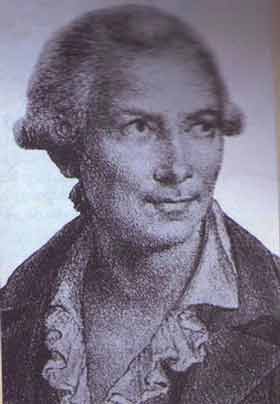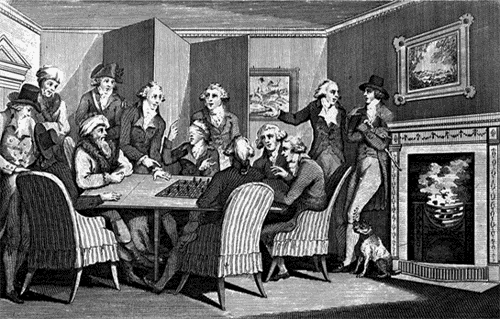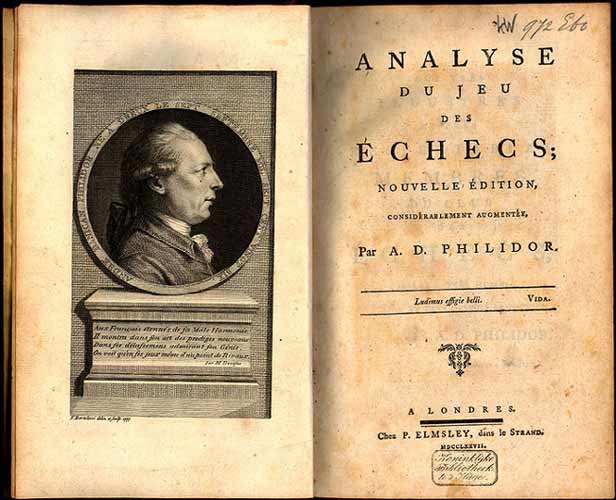|
François Andre Danican-Philidor

François André Danican, also known as Philidor, had a chess career that
spanned over 50 years. He was born into a family of musicians on September
7,1726 in Dreux, France. His father, who had more than 20 children, had
married twice and his second wife was was about 50 years younger than he.
Our Philidor was one of the youngest children from the second marriage and
by the time he was of age most of his siblings were already dead, as was his
father. Philidor was more or less on his own his entire life. Starting his
music career as a singer in a boys choir at age 6, it's said that when his
voice broke and he had plenty of free time, he would hang around the
musicians, many of whom played chess. It happened that one of them needed a
chess partner and none was available, so Philidor, who had never actually
played, offered to sit in. Philidor won the game - then took off running
fearing the wrath of his much oldest opponent.
Philidor was recognized as a musical prodigy, but the field of music was
highly competitive. At age 14 he went off to Paris to earn a living by
giving music lessons and copying scores. He started hanging around the Café
de la Régence which was the world's center for chess at the time. There he
met de Kermur, Sire de Legal, considered the best player in the café
(therefore, in Paris, and therefore, possibly in the world). Philidor became
so obsessed with chess that he lost most of his music students from neglect.
After 3 years, Legal was no match for him. At that time, 1744, Philidor gave
his famous simultaneous (2 games) blindfold chess demonstration. His results
were poor, =1 -1, but the demonstration was considered an extraordinary
display of mental power and praised throughout the world, making Philidor a
celebrity of sorts.

Philidor playing blindfold The next year Philidor took a job organizing a concert tour that featured a
13 year old harpsichord prodigy, the daughter of the producer. While in
Holland, the poor girl died and the tour closed. Philidor was stuck in
Rotterdam without funds. He started playing chess for money to survive. From
there on, chess became more than just a past-time for Philidor - it became
one of his sources of income.
When he earned enough money, he took off for England. In London he played
Phillip Stamma, the noted Syrian chess author whose reputation exceeded his
talent. Philidor beat him most conclusively (+8 -2, but one of the loses was
really a draw. Philidor had allowed that any draw to be considered a loss) ,
effectively ending Stamma's chess career. He also played against and
defeated (+4 -1) Sir Abraham Janssen whom many consider to have been
Philidor's strongest opponent.
 Returning to Holland in 1748, Philidor wrote his book, L'analyse du jeu
des Eschecs. This was the first real book since Greco's manuscripts were
compiled and printed. His approach was entirely unique. He wanted to teach
principles rather than moves. No one had ever approached chess in this
manner. He also understood something about positional play. He wrote the
famous line, Les pions sont l'ame du jeu or Pawns are the soul of
the game, indicating that pawns are the most static and therefore the
most reliable anchor with which to apply principles. His book was well
received.
He played a 3 game blindfold simul in Berlin in 1751, this time winning
every game. Except for a match with Legal in Paris, which he won, Philidor
devoted most of his time to music. It wasn't until 1771 that he started
playing chess seriously again - and this was in London. the Parsloe Chess
Club members underwrote Philidor's expenses to come there from February to
June each year which allowed him to earn extra money teaching and playing
side games. Philidor did this for 20 years and produced very little
musically during this time, so it might be surmised that chess had become
his main source of revenue.
Philidor started giving blindfold demonstrations to make a little extra
cash. While in Paris, he had played, and defeated the Turk, the famous
automaton built by Baron Wolfgang von Kempelen in 1770. Ironically, the Turk also
became his prime competitor for audiences in London.
Philidor republished his book twice. While successful in its official
releases, it was even more so in the cheaper rip-offs. It had a profound
influence on chess, particularly in England.
In 1792 Philidor was accidentally put on a French list of persona non
gratis, thanks to the French Revolution. He was stuck in England. It was
finally all straightened out after 2 years, during which he hadn't seen his
wife and children and supported them by sending his earning. But before he
could leave for France, he died. This was on August 24, 1795.
Philidor was buried at St. James in London. Of the possibly thousands of
games he had played, only 68 were ever recorded and even these games were
only those played in the last eight years before he died. We'll never fully
know the strength of Philidor in his prime.
|

